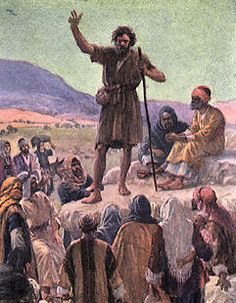"What should we do?"
Luke 3: 10-18
If you’ve ever found yourself having to deal with the sadness
of another person, we struggle to find words of comfort. It may be a sudden health crisis, the death
of a loved one, the loss of employment at a critical time or just a general
sense of disorientation in the life of another.
We want to comfort them, to cheer them up, to say something that would
express our sympathy. Yet, one of the
worst things to say, well meaning as it is, would be, “O, just cheer up” or “It could be worse,”
or something similar. Sometimes, in fact
often, in times of crisis the best response we may have is to simply say little and to stand with
another, to support them and to be present to them to show your
solidarity. The grieving process for
example takes time to work through.
Yet, our readings on this third Sunday of Advent nearly command
us to “Rejoice!” The prophet Zephaniah speaks to a people who have gone through
the destruction of their country and exile in a foreign land. He encourages them to “Shout for joy” and to “. . . be
glad and rejoice with all your heart.” Why would he say such a thing rather
than simply sympathize with them? Because it is God who will come and be
present with the people and his presence will be salvation and life giving: “The
Lord your God, is in your midst, a mighty savior.” Due to God’s intervention in a time of
great crisis, the people should rejoice.
Now this was the hope of the chosen people. That at some time in history God will finally
intervene in a definitive and final way on their behalf. Even the liturgical color of rose may be used this weekend to emphasize both joy and expectation. But, when will that time be? The answer to that question is found in our
Gospel.
After centuries of hope and promise in the midst of what seemed
like destruction, unfaithfulness, and abandonment a prophet to complete all
prophets appears in the desert and called people to repentance and to see that
now is the time for their deliverance.
We hear this Sunday once again from John the Baptist who now responds to
the questions of the varied crowds around him.
They come to ask: “What should I
do?”
John’s response is amazingly practical. We have an insight into how people of the
time lived. John encourages his crowd to
be generous, to share a portion of their food and clothing with those in need;
He encourages the toll (tax) collectors to be honest and not squeeze more money
from the people than is “prescribed.” Even soldiers, unexpectedly moved to
conversion, are told by John stop bullying people and to not be greedy and
abuse their power and position. In other
words John encourages the varied crowd to return to the moral code of the
sacred Torah, the law of God given centuries before. In this way of behavior and morality they can
be ready to meet the savior.
Despite John’s “tell is like it is” confrontation with the
crowd, they love the message and they begin to question whether John himself
may be the Messiah. Even after Jesus’
public appearance, John still had his followers, among who were the first of
Jesus’ disciples. John remains steadfast that he is not the one for someone “mightier than I is coming.”
The mark of a Christian is his loyalty to Christ. Jesus was far more than just another teacher
or wise man we follow. Jesus is the word
made flesh, the salvation of humanity sent by the Father in heaven; he is Lord
of our lives who was enfleshed among us and who died and rose from the
dead. No other figure in history has
ever made such claims. Therefore, John’s statement about the Holy Spirit and
fire is a reference to the grace of the Spirit (symbolized by fire as at
Pentecost) which cleanses in baptism and cleans out the “chaff.” In Christ we find a new beginning and a
renewal and rebirth of all human history.
To know this is cause for joy and rejoicing. Our God has given us a way out in the forgiveness of sin and a moral code to follow from the mind and heart of God.
Our moral and ethical behavior, then, reflects the gift that
Christ is to humanity. His teaching and morality provide for the world an
alternative to a life lived in darkness.
Christ brings light, hope and truth to the world in a way that this
world alone cannot sustain. This is the
good news which John preached and which we need to remind ourselves so “rejoice!”
The world today, which still sees greed, abuse of power, immorality,
rampant individualism, unrestrained choice and subjective morality needs to hear this and to
likewise clean away the obstacles that blind us from knowing God in our
life.
Isn’t that our preparation for Christmas? To clean away the road blocks that prevent us from running toward the Savior and from him reaching
us. It might be our sin, our greed, our
pride, our need to forgive and reconcile with another or whatever is keeping us
from welcoming Christ the Lord and Savior.
So, in the words of Paul the great apostle to the Gentiles at
this point in our Advent journey: “Rejoice in the Lord always . . . the Lord is
near.”
For all the oracles of the prophets foretold him,
the Virgin Mother longed for him
with love beyond all telling,
John the Baptist sang of his coming
and proclaimed his presence when he came.
(From Preface II of Advent)

No comments:
Post a Comment